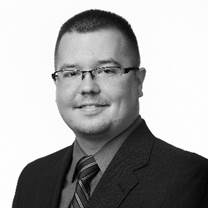MPA alumnus supports safety-net hospitals across the country with big data
As an undergraduate at Ohio University, Brian Roberson didn’t plan to spend his career working with data.
“I can’t claim that my history degree had any big data components,” said Roberson, who graduated from Ohio University in 2009 with a bachelor’s degree focused on European history. “I would say my interest in using data to solve problems was really born at the Voinovich School.”
Roberson entered the Voinovich School of Leadership and Public Affairs’ Master of Public Affairs program in 2010.
“As [my senior] year wore on, I decided that maybe going back for a graduate program would be better than trying to find a job in 2009 [during the Great Recession],” Roberson said.
He hoped to go into local government or work for an Ohio nonprofit, and was drawn to the Voinovich School’s focus on practical, experiential learning opportunities. He would never have predicted that he would wind up living in Washington D.C., working as a manager of data analytics for a major health care advocacy organization.
America’s Essential Hospitals advocates and develops policy for “safety-net hospitals”—institutions whose patients are mostly Medicaid recipients, under- and uninsured or otherwise vulnerable. The organization represents over 300 hospitals around the country, from the Zuckerberg San Francisco General Hospital and Trauma Center to the Ohio State University Wexner Medical Center.
“These are large, often academic, medical centers who really are the safety net organizations in health care for their community,” Roberson said.
Roberson started working for America’s Essential Hospitals (then called the National Association of Public Hospitals) as a research program assistant in 2012, shortly after graduating from the Voinovich School. He has been with AEH ever since.
In his current role, Roberson works between the organization’s two components: the policy-focused association, and the Essential Hospitals Institute, which conducts research to help its member hospitals.
“My job is to manage the data analytics infrastructure and respond to the data needs of each of those teams,” he said.
This summer, Roberson analyzed how the federal Coronavirus Aid, Relief and Economic Security (CARES) Act funding could help safety net hospitals manage the financial challenges of the COVID-19 pandemic. He also recently finished leading a research project that looked into the hospitals’ efforts to deal with the impacts of climate change on their operations.
“That would be things like emergency planning, responding to severe weather events to infrastructure changes … or a simple mitigation strategy like what antiseptic you use or what cleaners you use to get a good baseline as these topics become more on the forefront,” he said.
Roberson usually works on four to six projects at a time. He credits the Voinovich School with giving him the skills he needs to stay on top of everything.
“The diverse nature of all the different data requests and data projects that I’m on really requires the ability to juggle many different projects and prioritize,” he said. “One of the big things I learned at the Voinovich School is the project management aspect; those principles of project management are what allow all of this to happen.”
He knows that his path after graduation an unconventional one and hopes that it can be a message even to current MPA candidates to take advantage of every opportunity at the Voinovich School.
“I think a lot of times when people think MPA they’re thinking mostly around nonprofit management, or the policy angle of it, [and] the health policy angle, [but] I think the program really does open you up for a lot more possibilities than even you know when you’re in it,” Roberson said. “I would never have imagined that the data side is where I would be going.”
He hopes that more nonprofits will start to see the important of working with data.
“I think it would be good for leaders and mangers of those nonprofits, which the Voinovich School is trying to train, to be more knowledgeable about the use of data strategically,” Roberson said. “I think that’s something that students or someone whose interested in strategy or data should really think about how to apply that to nonprofits and the public administration space for the betterment of clients [and] for the betterment of their communities.”
